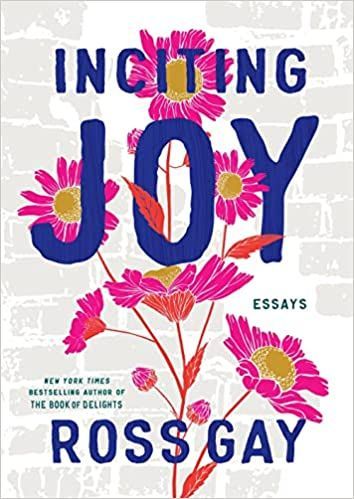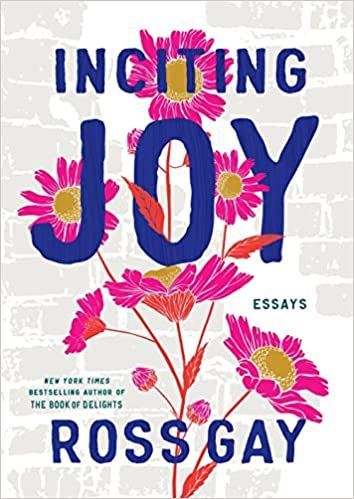New York Times best-selling author and National Book Award finalist Ross Gay may never read this interview, and that’s totally fine. It’s just not his style. While we’re entranced by our smartphones, scrolling away, he’s likely out in nature gardening, teaching, or gathering notes for his next essay or poem. It’s not that he’s anti-technology. It just doesn’t bring him joy the way a good walk with a trusted friend might.
Gay’s latest book of essays, Inciting Joy, feels very much like the aforementioned leisurely walk around the neighborhood with a good friend. Poignant, insightful, and beautifully written, the essays range from dark and difficult topics (like the one about the author’s dying father) to the delightful and downright funny. It’s this variety and playfulness that make Inciting Joy a salve to life’s disappointments.
Shondaland recently caught up with Ross Gay to talk about his new book, the power and mystery of language, why we’ll likely never see him on social media, what does and does not bring him joy, and so much more.
SCOTT NEUMYER: You wrote a lot of this book during the global pandemic of the past few years. How have you been holding up?
ROSS GAY: I think I’m doing well. I think, partly, I’m becoming more acutely aware of how (and this book kind of gets to that and emerges from it) sort of beholden we are to one another. I’ve been trying to pay more attention to that for a while now, but the last bit of time has made me more acutely aware of how in the midst of care I am. I’m feeling profound gratitude and also profound love for, and desire to witness, the ways we look out for one another.
SN: I want to say thank you for writing this book. I feel very strongly that I needed this book in my life right now, and I think others will feel that way too, as many did about your previous book of essays. When you set out to write something like this, is that always the goal, to find a way to make something that people feel like they need to have?
RG: That’s a great question. I haven’t known the answer to that, but today it just popped in my head. It’s that I feel like Toni Morrison. A while ago, she said something like she’s writing the books that she wanted to have in the world. I feel very strongly that this is a book that I really needed to have in the world. And I think my inclination is that if I need to have a book in the world, there are going to be other people who have similar overlapping or analogous questions to me.
SN: There are so many things that I want to explore about the book, but I want to first talk about your use of language. Obviously as a poet, you’re well versed in using language very specifically and effectively, but you start right from the title itself with this book — Inciting Joy. Tell me a little bit about using that word “inciting” specifically.
RG: I was trying to think of a word that was provoking. It’s funny because I had all these terrible titles. Some that were decent titles, and then some terrible titles. But then I felt like I was lost on the title. I couldn’t quite get it. My editors and the publishers had some ideas, and they were even worse than mine [laughs]. And then, I was at a little shop in Frenchtown, New Jersey, where I spent some time. And the woman named Meg, who runs a shop, I told her I was working on something, and she just gave me a notebook. And then, so boom — all these titles started coming out. And I started to realize that there’s something about understanding joy, exploring joy, considering joy. But I wanted it to be more, I don’t know, energetic in a certain kind of way. And the word “provocation” felt good, but there was actually a book by someone kind of in my realm who had that word in their title. So, I looked and saw that one of the synonyms for “provocation” is “incitement,” and I love that word because it means what I mean to do, which is, in a way, call up the implications of it. I mean, that’s it. Because I do in a way feel like this witness to and practice of our connecting and connectedness is a profound incitement. And it will rearrange the world.
SN: When most people think of “inciting” something, it’s often in a negative sense. Inciting a riot, for instance. But you use it here by telling people that they can (and should) make their own joy. In a way, it’s even more active than saying “finding joy.” It’s not a passive activity but rather an active one that kind of needs to be worked at. Was that subverting of people’s notion of the word itself part of the intention as well? Almost like a slap in the face saying, “Wake up! Joy isn’t going to just come to you.”
RG: Yeah, maybe, because I do feel like the way that the verb “inciting” joy works two ways: One is that it kind of asks the question, “How do we incite joy?” But then the other makes it a noun or an adjective, like joy is inciting. And so I think both of those maybe reconsider the hallmarking notion of joy that is something else, which is fine too, but I’m interested in this other kind of joy that’s more like an understanding that our time here is brief. It’s an understanding that everything we love will pass. There’s also a kind of tenderness and a kind of reaching that I think [happens when] practicing being in that awareness or maintaining the kind of state of awareness like that, which is hard. I think it incites a kind of behavior that we share.
SN: One of the things I love about the book as well is that it’s filled with so much variety. There are essays about these deep, heavy subjects like grief and death and toxic masculinity and capitalism. But then you also talk about lighter subjects like books, and laughter, and the art of “the hang” and just hanging out. That balance in the book makes me wonder if you have a full drawer of essays that didn’t make the cut for this book, as you very deliberately chose these pieces to provide balance. Do you have enough essays already written for a third collection?
RG: I have the beginnings. But I think you’re right. There is a sort of balance in the book. There’s a long essay about grief and masculinity, and there’s the essay about my father dying. Then there’s the essay about skateboarding, and there’s an essay about pickup basketball. There’s a quick one about dancing. So yeah, there’s absolutely a kind of balance that I was trying to have in the book.
SN: Obviously, your mastery of language is undeniable, but the brevity and tautness of the essays are also super-admirable. I have to assume that some of that comes from working as a poet, right?
RG: Totally. I spend time on sentences, on the syntax, on the grammar, and on the diction in ways that I know other nonfiction or fiction writers, for the most part, do not. I find myself really getting granular like that and taking a lot of pleasure in it. And some of my poet friends are also that way. They’re just really trying to drill down on the sound of a line. And sometimes, for better or worse, I’ll read something that I’ve written, and I’m like, “That sounds beautiful.” The sound of that has a meaning.
SN: Which is sometimes the mysticism of poetry, right? It doesn’t all have to make sense to people outside of you.
RG: Yeah, there’s a bodily sense that’s as important. It’s a feeling.
SN: Does that make writing the essays more challenging?
RG: I think that’s a great question. It doesn’t feel more difficult, but it feels like a different kind of mental/psychic/spiritual thing because, in part, I don’t even know how to articulate this, and maybe I never will, and maybe that’s a good thing, but there’s something about poems that remain, to me, more fundamentally mysterious.
SN: So, there’s never that aha moment where you’re like, “Yep, this one’s an essay!” or “Yeah, this one’s a poem.”
RG: I think they come to me at first usually in the form that they’re going to be. It’s possible that things can emerge one way and then be like, “You know, you’ve actually got to move them into this other thing.” So, I don’t. I can’t say 100 percent of the time, but for the most part, I know what I’m getting into.
SN: What do you find the most joy in these days?
RG: I’m teaching a great graduate class that’s ostensibly about research and archives, and we’re reading really cool books. I love teaching, and it’s taken me a long time to figure out how to do it, so I love it. But we’re working on a collaborative piece. We’re listening to each other’s work. We’re not critiquing each other. We’re just listening and being curious and open. And again, I’m just like, “Man, people are both so brilliant and also so loving in settings where we prepare the space for one another.” People are wonderful. And that’s the thing that I’m feeling really lucky about. That’s pretty magical.
SN: What type of activities do you find least joyful?
RG: I don’t like evaluating people. A lot of the things about my job are things that, if I did it right, I would hate. So, I don’t grade people. I give everyone A’s just because there’s not another button. But when I had to grade people, I hated it. All of those more mechanized things — anything that turns us into drones, actually — I really hate.
SN: You talk about this in the book quite a bit, putting the phone down, and you’re not on social media. Is there no joy to be pulled from social media? Do you not think your readers would find joy in seeing you experiencing and enjoying life as well?
RG: Yeah, I think they might get a little kick out of something, but being on social media, I think I would certainly have something cultivated in me that I don’t know that I want cultivated in me. But I think as far as joy is concerned, I think they might be more inclined or more likely to approach joy if they’re talking taking a walk with a friend.
SN: So, we’re never gonna see you on social media …
RG: Oh, no. Oh, no [laughs].
SN: That’s so interesting because I do find things joyful about it, but I can also understand the reticence.
RG: I also know that I’m distractible. I’m susceptible to that. I’m a regular person who wants to be liked and all that stuff. But I think our desire to be liked, or approved, or given the thumbs-up, or whatever … I think that is horrible for art. And that’s not at all to say that it can’t be usefully deployed. It’s all these other aspects, and it actually connects to what I think about school. School is just effectively an approval factory. You go to school not really to learn. You go to school to have the people in charge approve of you and to advance you. And there’s all these ways in our lives where that happens. And I think it’s bad for our souls.
Scott Neumyer is a writer from central New Jersey whose work has been published by The New York Times, The Washington Post, Rolling Stone, The Wall Street Journal, ESPN, GQ, Esquire, The Boston Globe, AARP, Parade magazine, and many more publications. You can follow him on Instagram and Twitter @scottneumyer.
Get Shondaland directly in your inbox: SUBSCRIBE TODAY







